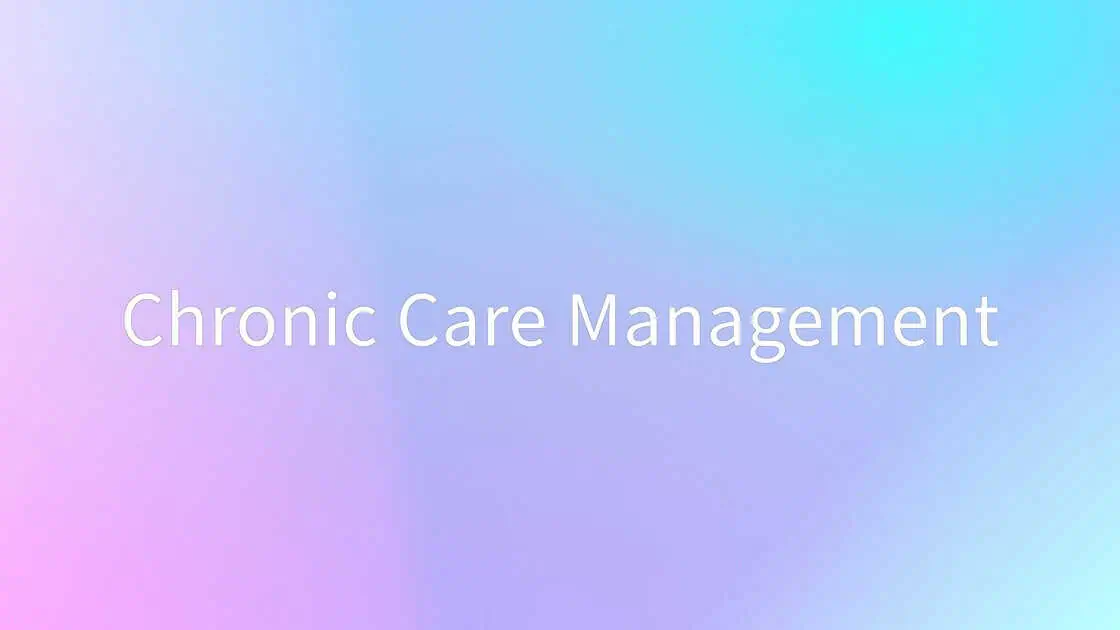Table of Contents
Chronic Care Management (CCM) helps you to take control of your health rather than being overwhelmed by your chronic conditions. Chronic pain affects the quality of life, so managing it is paramount.
But what is chronic care management? And who will be legible to avail it?
In this post, you will learn what chronic care management is and how you can use it to eliminate the hassle of constantly keeping a check on the details and planning for your health.
Chronic Care Management
Chronic care management is a service to assist you in achieving good health for your chronic diseases.
A thorough care plan that details your health issues, goals, doctors, medications, available and required community resources, and other relevant details are part of chronic care management. Additionally, it describes the type of care you need and how it will be arranged. You will need to sign a contract with your healthcare provider to begin benefitting from chronic care management.
It’s a service for managing numerous (two or more) chronic diseases that are projected to persist for more than three months or until the patient’s death. This service is typically delivered to non-face-to-face Medicare beneficiaries.
It provides ongoing care and support to help manage your condition daily.
Who Can Avail Chronic Care Management?
To qualify for chronic care management, a person should have two or more chronic diseases.
It’s highly advisable to consult a medical professional to determine whether you qualify for chronic care management.
What is Chronic Disease/Condition?
Chronic diseases are medical problems that last for a long time – ranging from more than three months to years – and that doesn’t get better or go away. The patients might endure the disease for a few years or a lifetime. These illnesses are particularly challenging to manage since patients frequently must learn to live with them rather than find long-term treatment.
It’s an ailment or illness that often lasts for three months or longer and has the potential to become worse over time. Older people are likelier to have chronic diseases, which can typically be managed but not cured. The most prevalent chronic illnesses are cancer, heart disease, stroke, diabetes, and arthritis.
Numerous chronic diseases affect millions of Americans.
Below are some chronic diseases that troubled many:
- Diabetes
- Osteoporosis
- Arthritis
- Cardiovascular disease
- Asthma
- Crohn’s disease
- Ulcerative colitis
- Thyroid disorders (Hypothyroidism or hyperthyroidism)
- High blood pressure (Hypertension)
- Type 2 diabetes
- Multiple sclerosis
- Lupus
- Heart disease
- Congestive heart failure
- Chronic obstructive pulmonary disease (COPD)
- Kidney disease
- Lipid disorders
Medical Differences Between Chronic Disease, Illness, and Condition
Chronic means an illness was persisting for a long time or constantly recurring.
“Chronic disease” is a phrase that frequently appears in conversations between patients and medical professionals, in scholarly writing and in policy discussions.
Not only can the illnesses that fall under the general heading of “chronic disease” vary greatly, but there are also differences in the length of time that a condition must exist before something is considered chronic.
Additionally, there is a movement to include long-term functional limitations such as developmental abnormalities and vision impairment that are not signs of disease but rather “chronic conditions.”
The terms “chronic disease” or “chronic condition” refer to slightly distinct concepts in popular Internet resources that the general public uses to learn about medicine.
Chronic Disease (The Diagnosed Disease)
Chronic disease is as one lasting three months or more, according to the U.S. National Center for Health Statistics.
In layman’s terms, chronic disease is a biomedical disease classification. Diabetes, asthma, and depression are examples of chronic diseases that fall within the “biomedical disease classification.”
Chronic Condition (The Condition of Chronic Disease)
While a chronic condition is, according to other sources: “an illness that develops over time or a human health condition that is persistent or has other long-lasting impacts. When a condition has a longer than three-month duration, the word “chronic” is frequently used.
A chronic condition is more sluggish in its development, may advance over time, and exhibit a variety of warning indications or none at all.
Chronic Illness (The Experience Enduring Chronic Disease)
Chronic illness is the individual’s experience of enduring the ailment that frequently accompanies a chronic disease.
Why Should You Avail Chronic Care Management?
A chronic illness requires a long-term medical plan to keep it under control because it develops slowly and may get worse over time. It may take time for some chronic disorders to be treated with medicine, surgery, physical therapy, or other procedures; in the meantime, continued care is required.
Reducing symptoms, enhancing the quality of life, and preventing avoidable hospitalizations are the objectives of chronic care management.
Regular monitoring is necessary to stop diseases like diabetes and asthma from developing into life-threatening conditions. Therefore, managing chronic diseases is crucial.
Chronic care management allows patients to connect the many parts of their healthcare, reduce the amount of travel, testing, and lab work required, and, frequently, enhance their general quality of life. With adequate care coordination services, healthcare professionals and patients can rely on a reliable Chronic care management services provider to simplify and facilitate their care process.
Plans for managing chronic conditions frequently include instructions on improving one’s lifestyle, including advice on diet, control of blood sugar, quitting smoking, and exercise regimens. Through this plan, patients can achieve the desired outcome.
The patients will be able to take advantage of beneficial community resources and programs thanks to chronic care management.
One of the most comforting advantages is that you should be able to speak with a doctor or any member of your medical team about any urgent issues whenever you need to, any hour of the day.
Let Professionals Help You with Your Chronic Diseases
Seek the best quality of life possible if you have one or more chronic diseases with chronic care management. Here at Health and Wellness Medical Services, we work to give each person, each family, and our community compassion, convenience, and outstanding healthcare.
Scheduling a consultation with us is easy. You can call us at 434-933-3318 or visit us at 1560 Insurance Lane, Charlottesville, VA 22911.








